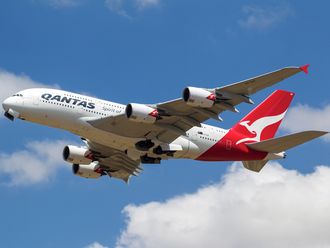Tokyo: The yen dropped against the dollar last week as the highest yields on 10-year US Treasury notes in a month renewed international demand for US assets as investors' risk aversion declined.
The Japanese currency slipped against a majority of its 16 most-traded counterparts and the Swiss franc declined as a report showed China's imports increased more than economists predicted.
The yuan headed for its biggest weekly gain since June as the US stepped up pressure on China to allow its currency to strengthen. The difference in yields between US and Japanese 10-year notes widened from the narrowest level since April 2009.
Optimism
"People are watching the difference between the US and Japan and they're more optimistic to buy the dollar due to this yield differential," said Hidetoshi Yanagihara, a senior currency trader at Mizuho Financial Group Inc in New York. "People are getting more optimistic about the upcoming economy in the US."
The yen weakened 0.5 per cent against the dollar to 84.17 at 4:16p.m. in New York, from 83.78 yesterday. It fell 0.6 per cent to 106.97 per euro, from 106.37 yesterday. The euro traded at $1.2709, compared with $1.2696, after falling to $1.2644, the weakest since August 31.
The Swiss franc slid 0.5 per cent to 1.2956 per euro from 1.2887 and fell 0.4 per cent to 1.0195 per dollar.
The premium investors demand to own US 10-year Treasuries instead of similar-maturity Japanese debt rose to 163 basis points today, jumping 17 basis points from a low of 146 reached September 7. A basis point equals 0.01 percentage point.
Chinese exports rose 34.4 percent and inbound shipments climbed 35.2 per cent, leaving a $20.03 billion (Dh73.5 billion) surplus, a customs bureau report showed today. It's the third straight month the trade surplus has stayed higher than $20 billion. A Bloomberg News economist survey predicted import gains of 27.5 per cent and 35 per cent for exports.
The yuan gained 0.2 per cent to 6.7692 per dollar, bringing its weekly advance to 0.5 per cent, according to the China Foreign Exchange Trade System. That was the biggest gain since the week ended on June 25 when it also appreciated 0.5 per cent.
US Treasury Secretary Timothy F Geithner said September 8 on Bloomberg Television that China should let the yuan rise more quickly. The US House Ways and Means Committee will discuss China's policy next week.
"Those advocating a tougher line against China in the US Congress may emphasise that August was the third consecutive monthly surplus above $20 billion," strategists led by Marc Chandler, global head of currency strategy at Brown Brothers Harriman and Co in New York, wrote in a note to clients.
Mexico's peso gained for a third day versus the greenback as oil, one of the country's largest foreign revenue generators, rose the most in six weeks.
The peso increased 0.7 per cent to 12.9252, from 13.0125. Crude oil for October delivery climbed 3 per cent to $76.47 a barrel.
Haven currencies
Haven currencies may extend their decline this week should the run of better-than-expected data persist. The Mannheim-based ZEW Centre for European Economic Research will probably say on September 14 its index of investor and analyst outlooks rose this month to 50, the highest since January 2008, from 44.3 in August, according to the median of 19 estimates in a Bloomberg News survey.
The outlook for the US economy may improve next week as economists forecast reports will show retail sales rose for a second month and manufacturing in the New York region expanded.
- 0.5% amount yen decreased against the dollar
- 0.6% amount yen decreased against the euro
- 0.7% amount the Mexican peso increased












